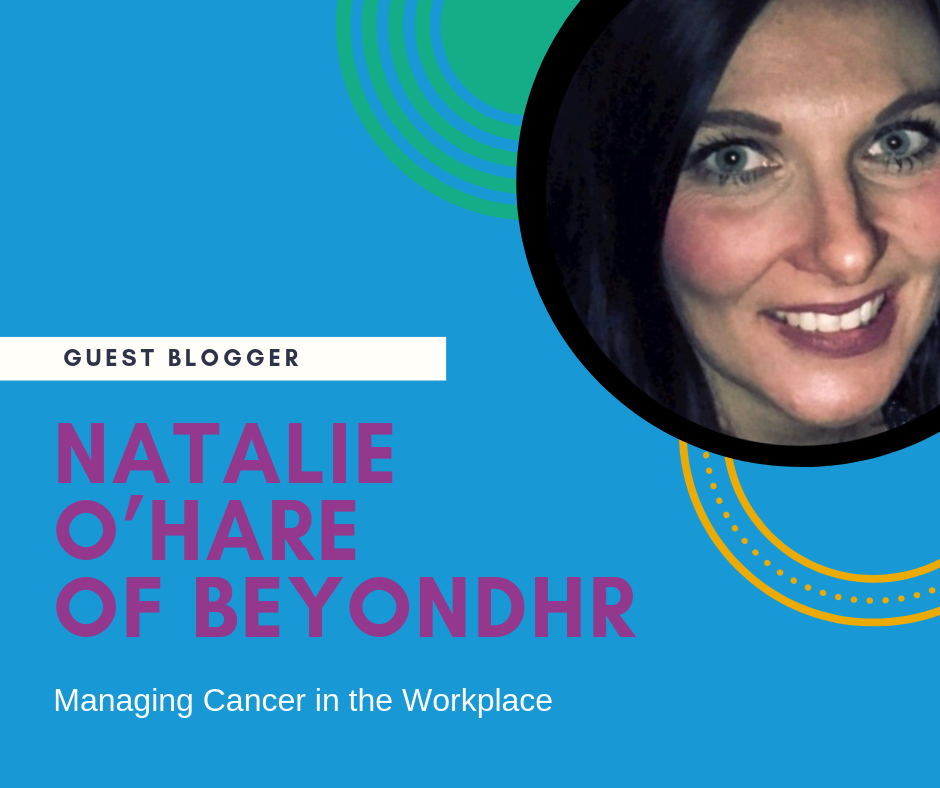Introducing Natalie O’Hare of BeyondHR.
August’s guest blogger for Cancer Support Scotland talking about managing cancer in the workplace.
About the work of BeyondHR
With over 27 years’ experience, BeyondHR are a team of ambitious and dedicated Consultants with offices in Northern Ireland and Glasgow, Scotland. As part of their consultancy team I am advising businesses everyday on all people related queries. Managers and business owners ask for guidance on having awkward conversations or gain confidence on what not to say or how to lead a conversation with regards to many illnesses including cancer.
Supporting those with cancer at work
With the alarming statistics on cancer diagnosis every year in the UK, managers and business owners will certainly have to (if they haven’t already) be able to deal with and help support employees on diagnosis, during their absence or long term sickness with the condition and also on an employee’s return to work. This level of support may stretch over prolonged periods and be very challenging on managers who may feel out their depth in dealing with this.
Cancer and employment law
There are many calls that come in around issues with managers simply not knowing what to say or do when an employee returns or tries to return to work following cancer.
Many managers are not aware of their legal obligations and where cancer fits in Employment Law. Those employees diagnosed with cancer, from day 1, automatically meet the disability definition under the Equality Act 2010. This Act also covers employees who have had cancer in the past. This means that reasonable adjustments must be made. By definition the term reasonable means that any changes or adaptations must be practical for the employer, in terms of cost and effects on other workers.
Reasonable adjustments will ensure employees feel comfortable and stay in their job or the workplace. For example, a new department or a less manual job may be a consideration. However, there’s no point in guessing. The employee will be able to tell you what they require or think could help them in the workplace. So have that conversation, ask those questions and try and understand their condition more – don’t be afraid to do so.
For reasonable adjustments to be made managers will have to have a real understanding of the condition and limitations in the workplace – it would be recommended to seek advice on the complex issues of reasonable adjustments.
Returning to work following cancer
Communication, empathy and support will be absolutely key to ensuring a successful return to work and being embedded back into the company and day to day working life.
Do you have an employee assistance programme in place or do employees have a professional to speak to?
Returning to work from cancer may mean employees need additional time off to attend regular check-ups, appointments or for emotional support. Flexible working may be requested by employees and remember employees with cancer have the right not to be treated unfairly in the workplace.
Cancer affects everyone differently.
Employees may return to work and wish to forget their diagnosis and lead as normal a life as possible and almost blank out the fact they have a diagnosis. How do you deal with this? You still have a legal duty to do all of the above and a legal duty of care for the employee’s wellbeing.
For some employees the absence from work, their diagnosis and/or treatment may lead to additional mental health symptoms to support. Employees may return to work not the same as when they first went off sick. Coping with the trauma of cancer the person will have dealt with a lot mentally and physically. They may need more reassurance and praise for a job well done and this is due to a loss in confidence or the effects of cancer such as memory loss and fatigue.
Final thoughts!
It’s important to remember though as managers we are not GP’s and are not expected to be. Yes, we need to have the conversations, support the employee and listen to their needs. Managers, however, are required to gain expert medical advice on considerations for the workplace and supporting a continued return to work.
Managers will need to be aware an employee may have been through the worst time of their life and need lots of support. That’s why helping the employee to stay in work – even on reduced hours or a phased return – can be challenging for you and the employee but being that supportive manager will make all the difference.
